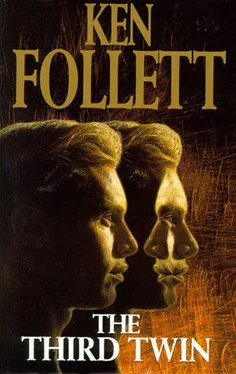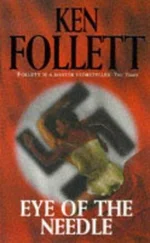Behind him, his father stood up. “Your Honor, I’m Steven’s father, Colonel Charles Logan. I’d be glad to answer any questions you may want to ask me.”
She gave him a frosty look. “That won’t be necessary.”
Steve wondered why she seemed to resent his father’s intervention. Maybe she was just making it clear she was not impressed by his military rank. Perhaps she wanted to say, “Everyone is equal in my court, regardless of how respectable and middle-class they might be.”
Dad sat down again.
The judge looked at Steve. “Mr. Logan, was the woman known to you before the alleged crime took place?”
“I’ve never met her,” Steve said.
“Had you ever seen her before?”
Steve guessed she was wondering whether he had been stalking Lisa Hoxton for some time before attacking her. He replied: “I can’t tell, I don’t know what she looks like.”
The judge seemed to reflect on that for a few seconds. Steve felt as if he were hanging on to a ledge by his fingertips. Just a word from her would rescue him. But if she refused him bail it would be like falling into the abyss.
At last she spoke: “Bail is granted in the sum of two hundred thousand dollars.”
Relief washed over Steve like a tidal wave, and his whole body relaxed. “Thank God for that,” he murmured.
“You will not approach Lisa Hoxton nor go to 1321 Vine Avenue.”
Steve felt Dad grasp his shoulder again. He reached up with his manacled hands and touched his father’s bony fingers.
It would be another hour or two before he was free, he knew; but he did not mind too much, now that he was sure of freedom. He would eat six Big Macs and sleep around the clock. He wanted a hot bath and clean clothes and his wrist-watch back. He wanted to bask in the company of people who did not say “motherfucker” in every sentence.
And he realized, somewhat to his surprise, that what he wanted most of all was to call Jeannie Ferrami.
23
JEANNIE WAS IN A BILIOUS MOOD AS SHE RETURNED TO HER office. Maurice Obeli was a coward. An aggressive newspaper reporter had made some inaccurate insinuations, that was all, yet the man had crumpled. And Berrington was too weak to defend her effectively.
Her computer search engine was her greatest achievement. She had started to develop it when she had realized that her research into criminality would never get far without a new means of finding subjects for study. She had taken three years over it. It was her one truly outstanding achievement, not counting tennis championships. If she had a particular intellectual talent, it was for that kind of logical puzzle. Although she studied the psychology of unpredictable, irrational human beings, she did it by manipulating masses of data on hundreds and thousands of individuals: the work was statistical and mathematical. If her search engine was no good, she felt, she herself would be worthless. She might as well give up and become a stewardess, like Penny Watermeadow.
She was surprised to see Annette Bigelow waiting outside her door. Annette was a graduate student whose work Jeannie supervised as part of her teaching duties. Now she recalled that last week Annette had submitted her proposal for the year’s work, and they had an appointment this morning to discuss it. Jeannie decided to cancel the meeting; she had more important things to do. Then she saw the eager expression on the young woman’s face and recalled how crucial these meetings were when you were a student; and she forced herself to smile and say: “I’m sorry to keep you waiting. Let’s get started right away.”
Fortunately she had read the proposal carefully and made notes. Annette was planning to trawl through existing data on twins to see if she could find correlations in the areas of political opinions and moral attitudes. It was an interesting notion and her plan was scientifically sound. Jeannie suggested some minor improvements and gave her the go-ahead.
As Annette was leaving, Ted Ransome put his head around the door. “You look as if you’re about to cut someone’s balls off,” he said.
“Not yours, though.” Jeannie smiled. “Come in and have a cup of coffee.”
“Handsome” Ransome was her favorite man in the department. An associate professor who studied the psychology of perception, he was happily married with two small children. Jeannie knew he found her attractive, but he did not do anything about it. There was a pleasant frisson of sexual tension between them that never threatened to become a problem.
She switched on the coffee maker beside her desk and told him about the New York Times and Maurice Obeli. “But here’s the big question,” she finished. “Who tipped off the Times?”
“It has to be Sophie,” he said.
Sophie Chapple was the only other woman on the faculty of the psychology department. Although she was close to fifty and a full professor, she saw Jeannie as some kind of rival and had behaved jealously from the beginning of the semester, complaining about everything from Jeannie’s miniskirts to the way she parked her car.
“Would she do a thing like that?” Jeannie said.
“Like a shot.”
“I guess you’re right.” Jeannie never ceased to marvel at the pettiness of top scientists. She had once seen a revered mathematician punch the most brilliant physicist in America for cutting in line in the cafeteria. “Maybe I’ll ask her.”
He raised his eyebrows. “She’ll lie.”
“But she’ll look guilty.”
“There’ll be a fight.”
“There’s already a fight.”
The phone rang. Jeannie picked it up and gestured to Ted to pour the coffee. “Hello.”
“Naomi Freelander here.”
Jeannie hesitated. “I’m not sure I should talk to you.”
“I believe you’ve stopped using medical databases for your research.”
“No.”
“What do you mean, ‘No’?”
“I mean I haven’t stopped. Your phone calls have started some discussions, but no decisions have been made.”
“I have a fax here from the university president’s office. In it, the university apologizes to people whose privacy has been invaded, and assures them that the program has been discontinued.”
Jeannie was aghast. “They sent out that release?”
“You didn’t know?”
“I saw a draft and I didn’t agree to it.”
“It seems like they’ve canceled your program without telling you.”
‘They can’t.”
“What do you mean?”
“I have a contract with this university. They can’t just do whatever the hell they like.”
“Are you telling me you’re going to continue in defiance of the university authorities?”
“Defiance doesn’t come into it. They don’t have the power to command me.” Jeannie caught Ted’s eye. He lifted a hand and moved it from side to side in a negative gesture. He was right, Jeannie realized; this was not the way to talk to the press. She changed her tack. “Look,” she said in a reasonable voice, “you yourself said that the invasion of privacy is potential, in this case.”
“Yes.…”
“And you have completely failed to find anyone who is willing to complain about my program. Yet you have no qualms about getting this research project canceled.”
“I don’t judge, I report.”
“Do you know what my research is about? I’m trying to find out what makes people criminals. I’m the first person to think of a really promising way to study this problem. If things work out right, what I discover could make America a better place for your grandchildren to grow up in.”
“I don’t have any grandchildren.”
“Is that your excuse?”
“I don’t need excuses—”
“Perhaps not, but wouldn’t you do better to find a case of invasion of privacy that someone really cares about? Wouldn’t that make an even better story for the newspaper?”
Читать дальше












